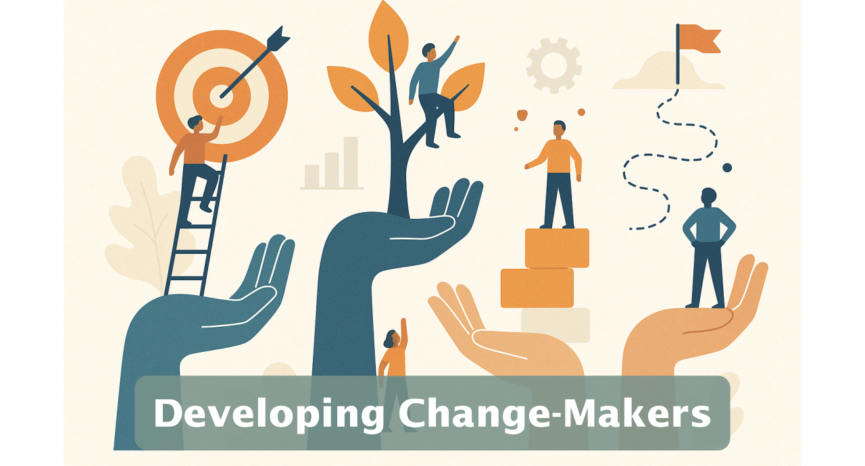Lessons in building capacity for bold, lasting organizational change
Every organization, at some point, faces the imperative of transformation—whether driven by external pressures, internal ambition, or both. The success of those transformations rarely hinges on a singular strategy or plan; instead, they often come down to one critical factor: the presence of capable change-makers.
Throughout my career, I’ve been privileged to lead transformational change and, just as importantly, to mentor others who are doing the same. This article is about what I’ve learned that might serve you as a leader looking to cultivate change agents within your own organization.
The Anatomy of a Change-Maker
True change-makers don’t just manage projects—they lead people through complexity, ambiguity, and resistance. They are part strategist, part guide, and part diplomat. The work takes courage, persistence, and a deep commitment to purpose.
But here’s the truth: no one becomes a change-maker alone. They are developed. They are guided. And they are supported by leaders who recognize their potential and invest in their growth—often with the help of experienced external mentors who can offer candid insights, challenge assumptions, and accelerate their learning curve.
The Power of Mentorship in Driving Transformation
Reflecting on my own journey, I was incredibly fortunate to be mentored early in my career by individuals who saw change as a vocation. One of my earliest mentors entrusted me—then a graduate student—with a major strategic analysis that led to the decision to close a hospital emergency department with the consolidation of services into a second location. The stakes were high, but so was the mentorship and support.
Later, as part of a multi-year transformation of a regional medical center, I served as the designated change agent working side-by-side with a visionary CEO. Together with clinical and operational leaders, we pursued an excellence-driven strategy that led to numerous national and statewide recognitions. That effort was only possible because the CEO invested deeply in our internal capacity for change—securing mentors who challenged and coached him and me every step of the way.
Today, I continue to play a similar role for others—supporting new change agents and executive leaders as they take on bold efforts to reshape their organizations and pursue ambitious visions. When organizations invest in developing these vital individuals, having an external guide who’s walked the path can make a powerful difference.
What Leaders Can Do to Develop Change-Makers
Whether you’re a CEO, a senior executive, or a board member, your role in developing change-makers is pivotal. Here are some actionable practices that have proven powerful in my work with organizations across sectors:
1. Identify potential, not just performance.
Some of the most effective change agents I’ve mentored didn’t begin with formal titles or long resumes in transformation work. What they did have was curiosity, tenacity, and a willingness to learn. Look for these attributes—and give them a platform.
2. Create meaningful opportunities.
Assign high-impact, visible projects that demand cross-functional collaboration and systems thinking. Let emerging leaders wrestle with real challenges with your steadfast support.
3. Serve as a guide, not a gatekeeper.
Great mentors provide a sounding board, not a prescriptive roadmap. They challenge thinking, share relevant experiences, and open doors to resources. In one case, I worked closely with a clinician newly appointed to lead quality improvement. Through candid conversations, joint problem-solving, and structured guidance, we built an approach that has reshaped how her organization improves care delivery.
When internal executives pair their personalized support with that of an experienced external mentor, they accelerate leadership development efforts and provide the up and coming change-maker with added layers of insight and clarity.
4. Build structures for change, not just slogans.
Transformation requires process and discipline. I’ve helped several leaders introduce new frameworks—strategic planning processes, measurement systems, continuous improvement practices—that allowed their organizations to achieve monumental progress over years.
5. Stay invested for the long haul.
True transformation doesn’t happen in a month. I’ve worked with some individuals periodically over multiple years as they transitioned into new chief executive roles or led multi-year excellence initiatives. Your ongoing involvement and belief in the change-makers can be the difference between momentum and burnout.

The Payoff: A Culture of Excellence and Impact
When leaders commit to developing internal change-makers, the entire organization benefits for years to come. One organization I supported went from a damaged reputation under prior leadership to becoming a model of community leadership and performance. Another is well on its way to becoming a benchmark of excellence—driven by a CEO and internal change leader who together are hungry to learn, experiment, and measure impact.
These results aren’t flukes. They’re the product of intentional leadership development, structured improvement, and a commitment to excellence that permeates from the top down—with mentorship playing a catalytic role.
Final Thought
Being a change-maker is not for the faint of heart. But every organization needs them—especially now. If you’re a leader who wants to leave a legacy, there may be no greater contribution than investing in those who will carry your vision forward and make it a reality.
And if you’re looking for a trusted guide to help accelerate that development, you don’t have to do it alone. Sometimes the right mentor—inside or outside your organization—can make all the difference.
May you recognize the change-makers in your midst, and may you be the mentor (or find one) they need most.

If you’d like to receive these Inspirations in your inbox every other week, you can subscribe to Kathy’s Excellence Advantage Inspirations Newsletter.
Kathy Letendre, President and Founder of Letendre & Associates, advises organizations and leaders to create their excellence advantage.
Contact Kathy by phone or text at 802-779-4315 or via email.

